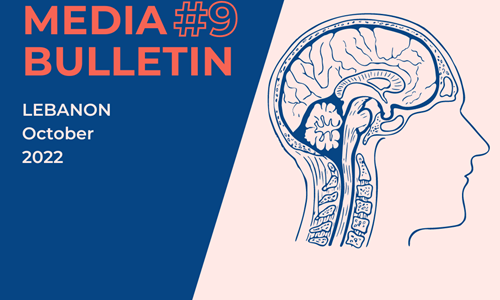
The Future of Lebanon’s Impunity and Human Insecurity, Three years after the Beirut Blast
1. No Peace Without Justice – Justice Delayed is Justice Denied
Three years after the man-made disaster that killed more than 220 persons, injured more than 7,000 injured, disabled more than 1,000 persons, and displaced more than 300,000 persons, Lebanon’s residents are faced with a bleak future, outlined by compounded calamities: failed governance, impunity, violation of public safety and human rights, and most importantly, heightened human insecurity.
We are still living with the perpetrators of the Beirut blast crime, and it has become long overdue to hold them accountable for homicide, instigating a blast, piling perilous goods, endangering the security of the port and the country, and polluting the environment. Justice for Lebanon and in Lebanon is indisputable because there can be no peace without justice.
Delay in justice is a means to defeat and deny justice. The rule of law, represented by an independent judiciary, is a primary tenet of a liberal and democratic society. Thus, the judiciary bears the responsibility of determining, vindicating, and developing rights that have an immense impact on how our society develops and flourishes, and with this development comes enhanced human security. However, unnecessary delay and expense of justice are detrimental to the achievement of justice.
Three years after the blast, families of the victims are unable to vindicate their rights through an independent judiciary, forcing them to resort to help in foreign courts. When the personal interests of a few litigants override and contradict the interests of the public, as the history of Lebanon has shown since the civil war, the imbalance of interests distorts the understanding of justice in society and, subsequently, the human security of the country. Therefore, citizens and residents must have access to fair and effective administration of justice.
2. Without the Rule of Law, There is No Human Security
Three years after what was described as the largest non-nuclear blast in history, and what the Lebanese refer to as the inflection point and a trauma-inducing event that deeply impacted Lebanon’s human security, we largely remain in the abyss. However, we cannot stay on the same course.
Human security is the freedom from fear and want, which remains unachievable if the judiciary persists to be the grantor of political immunity. Human security places the individual at the center of security, and Lebanon seems to be far from this realization, given the multitude of untreated crises including economic, food, health, environmental, political, and personal insecurities.
The implication of impunity and a politicized judiciary on the human security of future generations risk the regularity of similar crimes, hindering national unity in the absence of civil justice and the prevalence of resentment.
Human security is based on State ownership; therefore, it is the responsibility of the Lebanese Government to shield its citizens from economic, food, health, environmental, and personal insecurity, namely from human rights abuses and from political insecurity that stems from State oppression and human rights abuses. As a result, current and previous governments are primarily responsible for the completely preventable catastrophe.
The stalled investigation has paved and may still pave the way for defendants to bury, destroy, discard, or hide evidence, and erase their crime scene. The executive, legislative, and judicial branches should assume their responsibilities in ensuring a fair, independent, and impartial investigation, and ensure that security agencies facilitate the administration of justice rather than defy requests coming from investigating judges.
The London High Court of Justice’s ruling against Savaro Ltd., being the first court to rule in favor of the victims’ families in three years, has set a precedent that will aid in progressing the investigation and providing justice and compensation to families of the victims.
3. Blocking the Investigation of the Beirut Blast
Since the onset of the investigation, countless acts from the executive, legislative, and judiciary have obstructed the investigation and the investigative judges, preventing the latter from providing fair and impartial justice and resuming their work. More than 40 lawsuits have been filed against the current investigative judge, Judge Bitar, disavowing his competence without proof of the allegations he has been a target of.
4. What Needs to be Done?
A plethora of laws and policies ought to be enacted and amended to end immunity and achieve justice in Lebanon:
- Secure the right to life of every resident in Lebanon and avoid preventable tragedies in the future by enforcing the International Covenant for Civil and Political Rights (ICCPR) and the Universal Declaration of Human Rights, which Lebanon is a signatory of
- Lift parliamentary immunity to allow legal prosecution
- Amend Article 751 of the Country’s Code of Civil Procedure and Article 52 of the Code of Criminal Procedure to meet international standards and ensure that investigations are not indefinitely suspended when a defendant files a lawsuit against the investigative judge
- Enact a draft law for the independence of the judiciary that meets international standards as soon as possible as it will help the Higher Judicial Council (HJC) to play a decisive role in enacting the final decisions of the investigating judge. The HJC may not lay charges against the defendants indicted by the investigative judge when the judge concludes his/her investigation and transfers the defendants to the HJC. Therefore, an independent judiciary is essential to achieve justice, taking into consideration that the current HJC is under heavy political pressure and its decisions are not subject to appeal.
- Urge the Human Rights Council of the United Nations to pass a resolution to create an independent fact-finding mission into the Beirut blast
- Guarantee the right to a speedy trial and due process; Suspects in pre-trial detention cannot be detained indefinitely as it would violate their due process rights
- Put an end to intimidating and obstructive practices
An independent investigation means an independent judiciary where independent judges work without fear, political pressure, and interferences that circumscribe their investigation.
No compromises should be made in the investigation of the Beirut blast, as no deal or agreement should be able to restrict the investigation. Impunity is often the primary reason why the rule of law is not applied, and therefore a strongly anchored system of governance and accountability, strengthened by the enforcement of the rule of law, is long overdue and vital.
The international community is responsible to prevent, protect, and rebuild when national governments are unwilling or incapable of protecting their citizens, under the Right to Protect principle. We ask the international community to aid in the investigation, prosecution, and evidence protection and pressure the Lebanese authorities to pass laws that grant the judiciary its independence from the executive and the legislative branches.
Lastly, no amount of evidence removal, impunity, or stalling can ever erode or erase the memory and pain of families who have suffered the Beirut blast.





